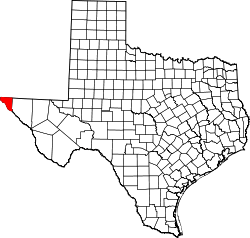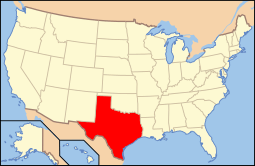El Paso County, Texas
| El Paso County, Texas | ||
|---|---|---|
 El Paso skyline | ||
| ||
 Location in the state of Texas | ||
 Texas's location in the U.S. | ||
| Founded | January 1850 | |
| Seat | El Paso | |
| Largest city | El Paso | |
| Area | ||
| • Total | 1,015 sq mi (2,629 km2) | |
| • Land | 1,013 sq mi (2,624 km2) | |
| • Water | 2.3 sq mi (6 km2), 0.2% | |
| Population | ||
| • (2010) | 800,647 | |
| • Density | 791/sq mi (305/km²) | |
| Congressional districts | 16th, 23rd | |
| Time zone | Mountain: UTC-7/-6 | |
| Website |
www | |
El Paso County is the westernmost county in the U.S. state of Texas. As of the 2010 census, the population was 800,647,[1] making it the sixth-most populous county in Texas. Its county seat is El Paso,[2] the sixth-most populous city in Texas and the 19th-most populous city in the United States.
El Paso is short for "El Paso del Norte" which is Spanish for "The Pass of the North." It is named for the pass the Rio Grande creates through the mountains on either side of the river. This county is east from the Mexican border.
El Paso County is included in the El Paso, TX Metropolitan Statistical Area. Along with Hudspeth County, it is one of only two counties in the state of Texas to fall into the Mountain Time Zone, instead of Central Time. It is one of the nine counties that comprise the Trans-Pecos region of West Texas.
Geography
According to the U.S. Census Bureau, the county has a total area of 1,015 square miles (2,630 km2), of which 1,013 square miles (2,620 km2) is land and 2.3 square miles (6.0 km2) (0.2%) is water.[3]
Adjacent counties and municipalities
- Doña Ana County, New Mexico – northwest
- Otero County, New Mexico – northeast
- Hudspeth County, Texas – east
- Guadalupe, Chihuahua, Mexico – south
- Juárez, Chihuahua, Mexico – southwest
- Práxedis G. Guerrero, Chihuahua, Mexico – southeast
National protected area
- Chamizal National Memorial
- El Camino Real de Tierra Adentro National Historic Trail (part)
Demographics
| Historical population | |||
|---|---|---|---|
| Census | Pop. | %± | |
| 1860 | 4,051 | — | |
| 1870 | 3,671 | −9.4% | |
| 1880 | 3,845 | 4.7% | |
| 1890 | 15,678 | 307.8% | |
| 1900 | 24,886 | 58.7% | |
| 1910 | 52,599 | 111.4% | |
| 1920 | 101,877 | 93.7% | |
| 1930 | 131,597 | 29.2% | |
| 1940 | 131,067 | −0.4% | |
| 1950 | 194,968 | 48.8% | |
| 1960 | 314,070 | 61.1% | |
| 1970 | 359,291 | 14.4% | |
| 1980 | 479,899 | 33.6% | |
| 1990 | 591,610 | 23.3% | |
| 2000 | 679,622 | 14.9% | |
| 2010 | 800,647 | 17.8% | |
| Est. 2014 | 833,487 | 4.1% | |
As of the 2010 United States Census, there were 800,647 people residing in the county. 82.1% were White, 3.1% Black or African American, 1.0% Asian, 0.8% Native American, 0.1% Pacific Islander, 10.5% of some other race and 2.5% of two or more races. 82.2% were Hispanic or Latino (of any race).
As of the census[6] of 2000, there were 679,622 people, 210,022 households, and 166,127 families residing in the county. The population density was 671 people per square mile (259/km²). There were 224,447 housing units at an average density of 222 per square mile (86/km²). The racial makeup of the county was 73.95% White, 3.06% Black or African American, 0.82% Native American, 0.98% Asian, 0.10% Pacific Islander, 17.91% from other races, and 3.19% from two or more races. 78.23% of the population were Hispanic or Latino of any race.
There were 210,022 households out of which 44.90% had children under the age of 18 living with them, 56.70% were married couples living together, 18.00% had a female householder with no husband present, and 20.90% were non-families. 17.80% of all households were made up of individuals and 6.70% had someone living alone who was 65 years of age or older. The average household size was 3.18 and the average family size was 3.63.
In the county, the population was spread out with 32.00% under the age of 18, 10.60% from 18 to 24, 29.30% from 25 to 44, 18.40% from 45 to 64, and 9.70% who were 65 years of age or older. The median age was 30 years. For every 100 females there were 93.20 males. For every 100 females age 18 and over, there were 88.70 males.
The median income for a household in the county was $31,051, and the median income for a family was $33,410. Males had a median income of $26,882 versus $20,722 for females. The per capita income for the county was $13,421. About 20.50% of families and 23.80% of the population were below the poverty line, including 31.50% of those under age 18 and 18.50% of those age 65 or over.
Politics
Most of El Paso County is included in the 16th Congressional District in the U.S House, represented by Democrat Beto O'Rourke. A small eastern portion of the county is in the 23rd Congressional District, represented by Republican Will Hurd. El Paso County is historically Democratic due to its large Latino population and the 2008 presidential election was no exception. Democrat Barack Obama won 66% of the vote and 121,589 votes even while he lost the entire state of Texas by about 946,000 votes. Republican John McCain won 33% of the vote in El Paso County and 61,598 votes. Other candidates won 1% of the vote. In 2004, Democrat John F. Kerry won El Paso County but by a smaller margin than Barack Obama. John Kerry won 56% of the vote and 95,142 votes. Republican George W. Bush won 43% of the vote and 73,261 votes. Other candidates won 1% of the vote.
The El Paso County Sheriff's Office is headquartered in an unincorporated area in El Paso County.[7] At one point it was headquartered within the City of El Paso.[8] The Leo Samaniego Law Enforcement Complex is adjacent to the sheriff's office headquarters.[9]
Like all Texas counties, El Paso County is governed by a Commissioners Court, which consists of a County Judge, who is elected county-wide, and four County Commissioners, who represent individual precincts.[10] While the County Judge possesses some traditional powers of a judge, the County Judge functions primarily as the chief executive of the county. The County Judge presides over Commissioners Court meetings, casts one vote on Commissioners Court (as do County Commissioners), and lacks veto authority.
The El Paso County Judge is Veronica Escobar, and the county commissioners are Carlos Leon (Precinct 1), David Stout (Precinct 2), Vince Perez (Precinct 3),[11] and Andrew Haggerty (Precinct 4). Haggerty is a Republican, the other commissioners and the county judge are Democrats.
Escobar was elected in 2010 and re-elected in 2014, and has been in office since 2011. Leon and Perez were first elected to their positions in 2012, and have been in office since 2013. Haggerty and Stout were first elected to their positions in 2014, and have been in office since 2015.[12]
Communities
Cities
Towns
Village
Census-designated places
Unincorporated communities
See also
- El Paso Holocaust Museum and Study Center
- List of museums in West Texas
- National Border Patrol Museum
- National Register of Historic Places listings in El Paso County, Texas
References
- ↑ 1.0 1.1 "State & County QuickFacts". United States Census Bureau. Retrieved December 10, 2013.
- ↑ "Find a County". National Association of Counties. Retrieved 2011-06-07.
- ↑ "2010 Census Gazetteer Files". United States Census Bureau. August 22, 2012. Retrieved April 26, 2015.
- ↑ "U.S. Decennial Census". United States Census Bureau. Retrieved April 26, 2015.
- ↑ "Texas Almanac: Population History of Counties from 1850–2010" (PDF). Texas Almanac. Retrieved April 26, 2015.
- ↑ "American FactFinder". United States Census Bureau. Retrieved 2011-05-14.
- ↑ "Contact Us." El Paso County Sheriff's Office. Retrieved on December 6, 2009.
- ↑ "Administration Division." El Paso County Sheriff's Office. April 5, 2001. Retrieved on December 6, 2009.
- ↑ "Communications Department." El Paso County. Retrieved on December 6, 2009.
- ↑ "County Commissioners Maps". Epcountyvotes.com. Retrieved 2013-08-30.
- ↑ "Leon, Perez take posts Tuesday". El Paso Times. 2013-01-01. Retrieved 2015-01-03.
- ↑ http://www.elpasotimes.com/news/ci_27219139/two-new-faces-join-county-commissioners-court-new
External links
- El Paso County Official web site
- El Paso County in Handbook of Texas Online at the University of Texas
- Historic El Paso County materials, hosted by the Portal to Texas History.
- Fort Bliss National Cemetery Disgrace Video
 |
Doña Ana County, New Mexico | Otero County, New Mexico |  | |
| Doña Ana County, New Mexico | |
Hudspeth County | ||
| ||||
| | ||||
| Juárez, Chihuahua, Mexico | Guadalupe, Chihuahua, Mexico | Práxedis G. Guerrero, Chihuahua, Mexico |
| |||||||||||||||||||||||||||||
| ||||||||||||||||||
| ||||||||||||||||||||||||||
